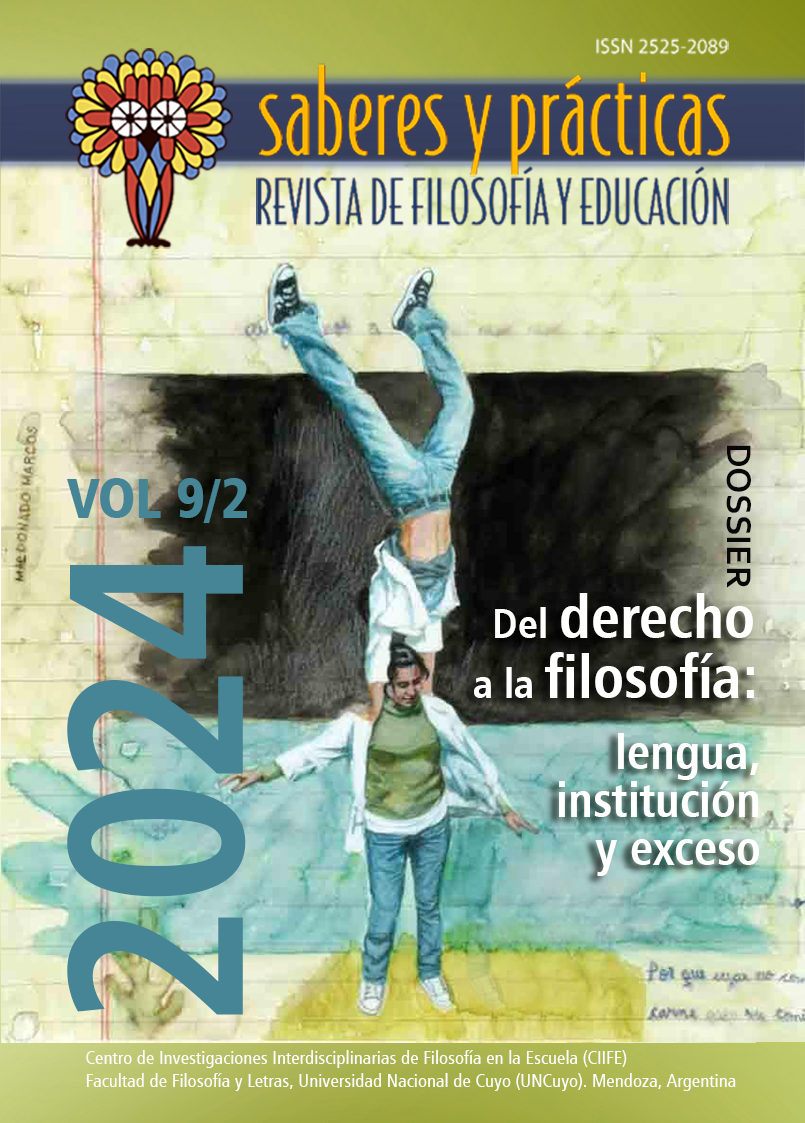¿Quiénes tienen derecho a la filosofía?
Aportes para un abordaje interseccional de las prácticas filosóficas
DOI:
https://doi.org/10.48162/rev.36.123Palavras-chave:
Direito à Filosofia, Objeto da filosofia, Práticas filosóficas, Interseccionalidade, Filosofia de ensinoResumo
Este artigo explora o problema do destinatário do direito à filosofia, tal como apresentado e desenvolvido por Derrida (2023). Propõe uma abordagem situada e interseccional, que nos permite rever o problema de um ponto de vista que pode contribuir para a materialização deste direito no campo da educação. Para o efeito, são analisadas duas situações particulares: por um lado, as reformas do currículo dos cursos de formação de professores do ensino superior do CABA e, por outro, a inclusão da filosofia como área estratégica nas bolsas de ajuda financeira Manuel Belgrano. Com base nestes casos, propõem-se algumas derivações conceptuais que nos permitem pensar as práticas e teorias filosóficas de uma forma diferente. Estas abordagens estão sobretudo ligadas aos destinatários do pensamento filosófico e às subjectivações que se desenvolvem em torno dele. Essas considerações são fundamentais para a necessária transformação da práxis filosófica, de modo a materializar e garantir o direito à filosofia, especialmente para grupos que foram historicamente expulsos e segregados dessa possibilidade.
Downloads
Referências
Ávalos Valdivia, C. (2023). Estudio introductorio. En J. Derrida, Jacques Derrida. Privilegio o del derecho a la filosofía (pp. 11-30). UACh.
Bruns, B. y Luque, J. (2014). Profesores excelentes. Cómo mejorar el aprendizaje en América Latina y el Caribe. Banco Mundial, Foro sobre el desarrollo de América Latina. https://dds.cepal.org/redesoc/publicacion?id=3806
Butler, J. (2018). ¿Puede hablar el “otro” de filosofía? En Deshacer el género (pp. 329-331). Paidós.
Cantarelli, M. N. y Mamilovich, C. (2021). Inquietudes sobre el cuerpo. Notas en torno a una erótica pedagógica. Cuadernos de Filosofía, (77), 39-58. http://revistascientificas.filo.uba.ar/index.php/CdF/article/view/12104
Cantarelli, N. y Galazzi, L. (2019). Consideraciones sobre el silencio: prácticas patriarcales en el Profesorado de Filosofía (UBA). Avatares Filosóficos. Revista del Departamento de Filosofía, FFyL/UBA, (6), 92-101. http://revistas.filo.uba.ar/index.php/avatares/article/view/3680/2459
Crenshaw, K. (1989). Demarginalizing the intersection of race and sex: A Black feminist critique of antidiscrimination doctrine, feminist theory, and antiracist politics. University of Chicago Legal Forum, 1989(1), 139-167. https://chicagounbound.uchicago.edu/uclf/vol1989/iss1/8
Cumes Simón, A. (2014). La “india” como “sirvienta”: servidumbre doméstica, colonialismo y patriarcado en Guatemala [Tesis de doctorado]. CIESAS.
Derrida, J. (2023). Jacques Derrida. Privilegio o del derecho a la filosofía (Trad. C. Ávalos Valdivia). UACh.
Despret, V. y Stengers, I. (2023). Las que hacen historias. ¿Qué le hacen las mujeres al pensamiento? (Trad. V. Goldstein). Hekht Libros.
Fernández, A. M. (1993). La invención de la niña. UNICEF Argentina.
Fleisner, P., Lucero, G., Galazzi, L. y Billi, N. (2023). La teoría de Haraway del conocimiento situado y su vínculo con la ontología relacional de Barad y el análisis de prácticas académicas en Stengers y Despret. Nuevo Itinerario. Revista de Filosofía, 9(1), 76-91. https://doi.org/10.30972/nvt.1916712
Galazzi, L. (2019). ¿Aportar a la igualdad desde una meritocracia? Paradojas de la filosofía institucionalizada. Ideas. Revista de filosofía moderna y contemporánea, 5(9), 203-211. https://revistaideas.com.ar/ojs3/index.php/ideas/article/view/281
Galazzi, L. (2020). Pistas para un devenir minoritario de la filosofía en la universidad: herencia institucional y perfiles filosóficos. En A. Cerletti y A. Couló (Eds.), La filosofía en la universidad: entre investigadores y profesores (pp. 49-76). Noveduc.
Galazzi, L., Gómez, D. y Vázquez, M. (2019). Políticas mundializadas de formación docente: propuestas para una lectura filosófica. Revista Praxis y Saber, 10(22), 19-43. https://doi.org/10.19053/22160159.v10.n22.2019.9308
Haraway, D. (1993). Saberes situados: el problema de la ciencia en el feminismo y el privilegio de una perspectiva parcial. En M. Cangiano y L. DuBois (Eds.), De mujer a género. Teoría, interpretación y práctica feminista en las ciencias sociales (pp. 115-144). CEAL.
Haraway, D. (2019a). Seguir con el problema. Generar parentesco en el Chthuluceno (Trad. H. Torres). Consonni.
Haraway, D. (2019b). Ciencia, cyborgs y mujeres. La reinvención de la naturaleza (Trad. M. Talents). Ibérica.
Kant, I. (2003). El conflicto de las facultades (Ed. y Trad. R. Aramayo). Alianza. (Original publicado en 1798).
Lugones, M. (2005). Multiculturalismo radical y feminismos de mujeres de color. Revista Internacional de Filosofía Política, (25), 61-76. https://dialnet.unirioja.es/servlet/articulo?codigo=1262684
Lugones, M. (2008). Colonialidad y género. Tabula Rasa, (9), 73-101. https://www.revistatabularasa.org/numero-9/05lugones.pdf
Lugones, M. (2021). Peregrinajes: teorizar una coalición contra múltiples opresiones (Trad. C. Porta Massuco). Del Signo.
Morgade, G. (1997). La docencia para las mujeres: una alternativa contradictoria en el camino hacia los saberes legítimos. En G. Morgade (Ed.), Mujeres en la educación. Género y docencia en la Argentina 1870-1930 (pp. 67-114). Miño y Dávila.
Rabossi, E. (2008). En el comienzo Dios creó el Canon: Biblia berolinensis. Gedisa.
Publicado
Como Citar
Edição
Seção
Licença
Copyright (c) 2024 Laura Galazzi
Este obra está licenciado com uma Licença Creative Commons Atribuição-NãoComercial-CompartilhaIgual 2.5 Argentina.


































